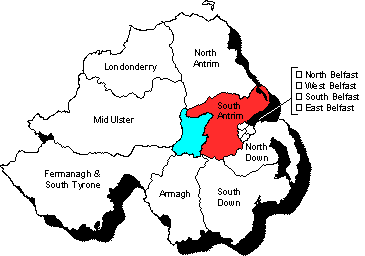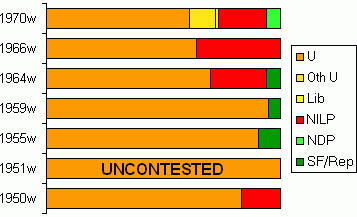

 |

|
|
|
|
|

|

|
| Map and diagram by Conal Kelly | |
This constituency, located to the north and west of Belfast, was established in 1948 and incorporated the southern portion of the old county Antrim two-seat constituency. Between 1950 and 1970 the constituency was represented by three different MPs, all of whom were Unionist. The longest serving of these was Sir Knox Cunningham who was first elected in 1955 and continued to represent the constituency until his retirement in 1970. All elections held during this period were contested, with the exception of 1951. The declared winner was Unionist nominee and incumbent Douglas Savory. The constituency recorded the lowest turnout in 1950 general election.
See also election results for South Antrim 1973-1982, 1983-1992 and 1993-2007.
| U | U | Lib | NILP | NDP | SF/Rep | |
| 1970w | 61.1% | 11.2% | 0.9% | 20.5% | 6.2% | |
| 1966w | 64.3% | 35.7% | ||||
| 1964w | 69.9% | 24.4% | 5.7% | |||
| 1959w | 95.1% | 4.9% | ||||
| 1955w | 90.7% | 9.3% | ||||
| 1951w | * | |||||
| 1950w | 83.6% | 16.4% |
* The only candidate nominated for the 1951 General Election was Unionist Douglas Savory. He was therefore duly elected without a contest.
Unionist majority: 39,618; electorate: 143,274; votes cast: 68.0%
After
15 years
as an MP for South Antrim and a prior 10 years for Queens University,
Knox Cunningham announced his retirement and did not seek re-election
in 1970. In his place the Unionists selected James Molyneaux, Cunningham's agent and a member
of Antrim County Council. He faced four opponents including an
Independent pro-reform Unionist, Tom Caldwell, who represented Willowfield in the
Northern Ireland House of Commons. The result was a comfortable win
for Molyneaux by a margin of almost 40,000 votes. The NILP managed to
come in second but at only 20% of the poll, losing ground on their 1966
result.
Molyneaux continued the record set by his predecessor by amassing the
highest personal vote of the election in Northern Ireland but this was
greatly assisted by the size of the electorate in South Antrim. At over
143,000, South Antrim was significantly larger than the Northern Ireland
average of 84,766 and two and half times as big as the smallest
constituency of South Belfast.
James Molyneaux would later lead the Unionist parliamentary party
beginning in 1974 and assume the overall party leadership in 1979. He
would later represent the Lagan Valley constituency from 1983-1997.
Unionist majority: 18,168; electorate: 113,643; votes cast: 55.9%
In a repeat of
the 1964 election, Cunningham and Stewart again squared off, however
this time without a republican candidate. Cunningham was once again
declared the victor, winning his fourth successive election and
garnering the most votes of any candidate in Northern Ireland. The
NILP recorded their highest poll in South Antrim, one of only four seats
they contested in 1966. Stewart managed to increase his share of the
poll to 35% and reduce his opponent's majority to just over 18,000.
Stewart had also stood unsuccessfully for the Northern Ireland House
of Commons in the 1965 general election for the constituency of South
Antrim.
Unionist majority: 30,794; electorate: 105,304; votes cast: 64.3%
Cunningham seeking a third successive victory faced two opponents in 1964. Sydney Stewart was representing the NILP who had not contested the constituency since 1950, while Leo Wilson stood on an abstentionist republican ticket (Sinn Fein was now a proscribed organization). Cunningham won comfortably, although with a significantly reduced majority. He once again achieved the highest vote of any candidate in Northern Ireland. In their second best result of the election, the NILP managed to take 24% of the poll.
Unionist majority: 50,041; electorate: 93,655; votes cast: 59.3%
The incumbent Cunningham
again squared-off with his Sinn Fein opponent Michael Traynor in a repeat
of the 1955 general election. Cunningham successfully defended his seat, once
again recording the highest vote in Northern Ireland and increasing his
majority to over 50,000. The Sinn Fein dropped dramatically here as elsewhere
in Northern Ireland in light of the IRA's divisive Operation Harvest campaign.
Cunningham was subsequently picked by Conservative Prime Minister Harold
Macmillan as his Parliamentary Private Secretary, responsible for the Prime
Minister's relations with backbench MPs.
Unionist majority: 45,192; electorate: 84,939; votes cast: 65.3%
The incumbent Savory
did not seek re-election in 1955 and he was replaced on the Unionist ticket
by (Samuel) Knox Cunningham. Cunningham, a Barrister, had unsuccessfully contested
the West Belfast constituency in the 1943 by-election and again in the general
election of 1945. This time out his opponent was veteran republican and one time
hunger-striker Michael Traynor. Traynor was standing on a Sinn Fein abstentionist
ticket. The result was a massive victory for Cunningham, amassing more votes than
any other candidate in Northern Ireland and achieving a majority in excess of
45,000.
One interesting footnote is that in 1954 Cunningham had been elected as a
councilor to Orpington Urban District Council in south-west London.
Unionist Candidate Elected Unopposed.
Savory was the sole candidate nominated in South Antrim and was duly elected without a contest. South Antrim was one of four seats that went uncontested in the 1951 general election in Northern Ireland. The sole nominee (and hence winner) in each instance was the Unionist candidate.
Unionist majority: 32,955; electorate: 77,499; votes cast: 63.3%
The
1950 general election saw the elimination of the Antrim two-seat
constituency which was replaced by North Antrim and South Antrim. In
this, the first election fought in the new South Antrim constituency,
the result was a comfortable victory for the Unionists, producing their
largest majority of the election. The successful Unionist candidate was
Douglas Savory, the professor of French and Romance Languages at QUB,
who had been the Unionist MP for Queens University since 1940.
However as a result of the provisions of the Representation of the
People Act, the Queen's University seat had been eliminated and
Northern Ireland’s Westminster representation was reduced from 13
MPs to 12. This was one of just five seats contested by the NILP in
1950.
Brown would later stand unsuccessfully in South Belfast in the 1955
Westminster election.
See also:
Results from 1950 to 1970 for each seat: East Belfast | North Belfast | South Belfast | West Belfast | North Antrim | South Antrim | Armagh | North Down | South Down | Fermanagh and South Tyrone | Londonderry | Mid Ulster
Other sites based at ARK: ORB (Online Research Bank) | CAIN (Conflict Archive on the INternet) | Northern Ireland Life and Times Survey
Your comments, please! Send an email to me at nicholas.whyte@gmail.com.
Conal Kelly, 1 June 2007.
|
Disclaimer:©
Nicholas Whyte 1998-2004 Last Updated on Wednesday, 12-Jan-2005 12:12
|